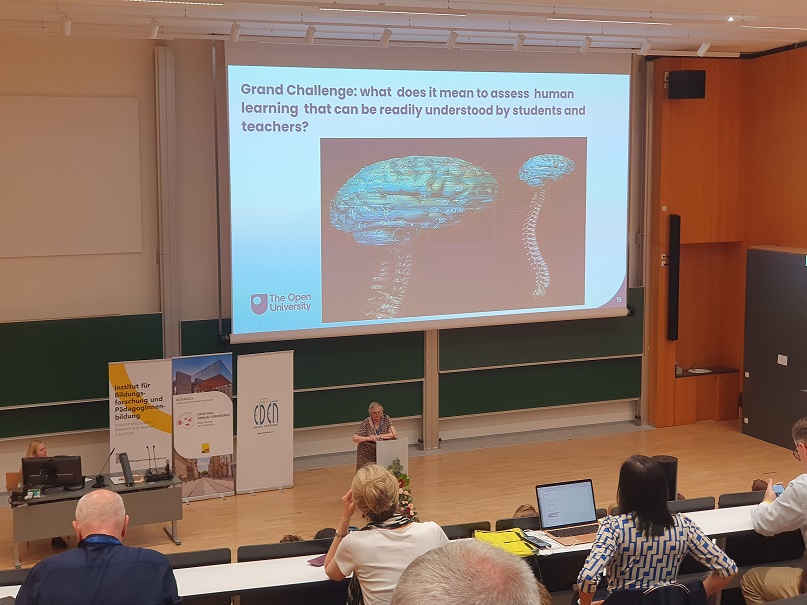IET was strongly represented at this year’s EDEN conference, where Denise Whitelock and Thomas Ullmann gave presentations about generative AI for teaching and learning.
EDEN is the flagship conference of Europe’s leading network for advancing digital education. This year, it was held in sunny Graz, Austria, from June 16 to 19, 2024, with a great line-up of keynotes and presenters, including a keynote by our director, Denise Whitelock.

EDEN DLE Vice-President for Research, Director for the Institute of Educational Technology of The Open University (UK) Denise Whitelock presenting ‘Moving Forward with AI and Automatic Feedback Systems: Opportunities and Challenges for Student Success’
The conference theme, ‘Learning in the age of AI: Towards imaginative futures, was very timely, especially when considering the recent hype around AI and generative AI.
IET was present at the conference with three full papers that provided a research perspective on the benefits and drawbacks of generative AI in education.
Denise Whitelock presented research on a recent collaboration with KMi entitled: ‘An institutional AI digital assistant: what do distance learners expect and value?’. The mixed-methods study explored the perspectives of 10 distance learning students on whether the development of an institutional AI Digital Assistant might mitigate concerns about data privacy, academic integrity, intellectual property, and quality education. The paper was nominated as a best paper candidate.
Thomas Ullmann presented work about generative AI and curriculum production. With the hype around generative AI and its capability to produce rapidly plausible-sounding text, the paper explored whether generative AI can be used to produce course content. For this, we looked at a comprehensive set of curriculum production tasks and evaluated all of them by asking experts about the quality of the generated content. This research was one of the outcomes of a PVC-RI challenge set for IET’s QEI team (https://iet.open.ac.uk/quality-enhancement-and-innovation). The details of the full paper can be found in this pre-print on ORO:
Ullmann, T.D., Bektik, D., Edwards, C., Herodotou, C. and Whitelock, D. (2024) ‘Teaching with Generative AI: moving forward with content creation’, in. Annual Conference on European Distance and E-Learning Network, EDEN 2024, Graz, Austria. Available at: https://oro.open.ac.uk/97180/
Duygu Bektik’s paper will be useful to everyone interested in the state-of-the-art in ‘AI to support teachers in content authoring and curriculum production’. The literature review showed that generative AI is envisioned as a co-design partner in enhancing educational content such as rubrics, lesson plans, interactive exercises, analogies, reflective questions, and case studies tailored to learning goals and instructional needs. But also highlights key issues around accuracy, reliability, and the potential to lead to plagiarism. The details of the full paper can be found in this pre-print on ORO:
Bektik, D., Ullmann, T.D., Edwards, C., Herodotou, C. and Whitelock, D. (2024) ‘AI-Powered Curricula: Unpacking the Potential and Progress of Generative Technologies in Education’, in. Annual Conference on European Distance and E-Learning Network, EDEN 2024, Graz, Austria. Available at: https://oro.open.ac.uk/98012/
Many of the presentations at EDEN were about generative AI, which shows how quickly this technology has captured the imagination of researchers. Our presentations were well attended, and people struggled to get seats, indicating the amount of interest we had generated with IET’s work.